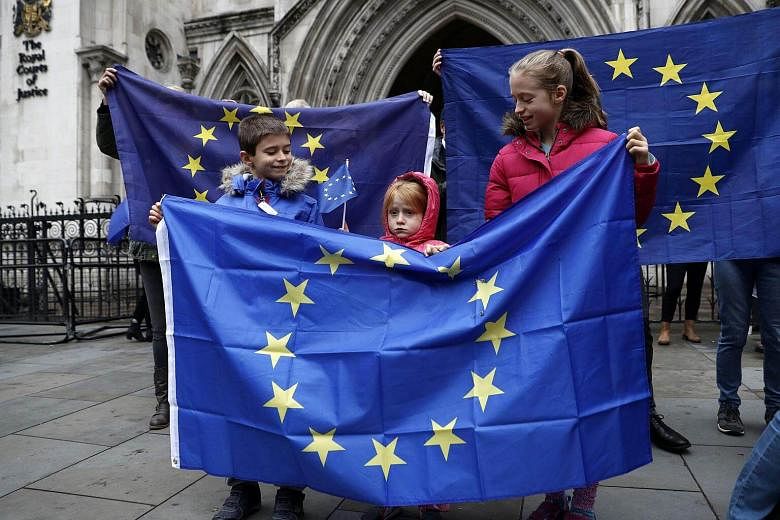The world has turned out to be a less progressive, more unpredictable and unstable place than many of us have imagined it to be.
In this new dispensation, there exists a form of hard-edged, great-power politics that is ominous. Violence, be it inter-state or involving transnational terrorist groups, is on the rise.
There is a clear trend towards fractious domestic politics, with a precipitous decline in the civility of public discourse. Populism and populists are ascendant. At times, diplomacy resembles an unfiltered reality TV show more than the serious enterprise that it is.
To state only the most obvious examples, since the global financial crisis of 2008, we have seen the following occur: the election of Mr Donald Trump as president of the United States; the United Kingdom's Brexit vote; Russia's annexation of Crimea; the subsequent Russian military intervention in Syria, itself the location of a severe humanitarian crisis; major disputes between China and some of its neighbours over sovereignty claims in the East China and South China seas; North Korea's unabashed pursuit of a nuclear weapons capability in defiance of numerous United Nations Security Council resolutions; and the persistence of international terrorism.
Taken on their own, each of these is deadly serious. Collectively, they amount to a genuine shift in world affairs. What's going on here?
What we are seeing is the outright rejection, by multiple parties, of the view that we live in a "borderless world" where the owners of financial capital have licence to operate with minimal controls. Also in the dustbin is the idea, epitomised by Francis Fukuyama's End Of History hypothesis, that liberal democracy is the end point of global political evolution. Unelected bureaucrats, be it in the Asian Development Bank, the European Union or the North Atlantic Treaty Organisation, are in disrepute. State power, once declared to be on life support, is patently flourishing.
It was not meant to be this way. How did we get to this point?
Any convincing answer will have to include a discussion of the deep complacency that took residence in liberal democratic polities during the period of relative peace between the end of the Cold War and the 9/11 attacks on the US. This complacency was reflected in the widespread and tenacious belief that the other participants in the international system necessarily saw things the way they did, and valued the status quo as much as them.
The status quo was manifest in the premier liberal project, globalisation. This was supposed to bring sustained economic growth and a flourishing of liberal democracy. Complementing this view, regional and global integration was to be achieved by an alphabet soup of institutions ranging from the African Union to the World Trade Organisation.
The project has failed. But, it is neither correct nor fair to focus culpability solely on the liberal democracies. Regimes ruled by psychopaths, such as in North Korea and Syria, not to mention the equally deranged Islamic State in Iraq and Syria, simply rejected the entire enterprise. Eminently more rational actors, notably China and Russia, implemented the parts of the globalisation project that they agreed with, and rejected the parts that worked against their interests. Their role in this story requires further illumination.
The success of China's economic reforms has been facilitated by global rules supporting freedom of navigation, embodied in the United Nations Convention on the Law of the Sea (Unclos), which China ratified in 1996. In July 2012, China announced that its control of Woody Island in the Paracel Islands section of the South China Sea entitled it to jurisdiction over most of the South China Sea. When an international tribunal unambiguously ruled in July this year that this was a clear contravention of Unclos, China dismissed the ruling in caustic terms.
Russia has regularly used its status as a permanent member on the UN Security Council to veto resolutions that it claims undermine international law and state sovereignty. Thus, it opposed US efforts to use force against Saddam Hussein's Iraq and the Slobodan Milosevic regime in the former Yugoslavia. Yet, when its interests dictated, Moscow has adopted a rather less principled stance. In February 2014, Russia reacted to the overthrow of the pro-Russian Viktor Yanukovych regime in Ukraine by methodically violating its neighbour's sovereignty, aiding and abetting the pro-Russian, anti-Kiev opposition in eastern Ukraine. This culminated in the Russian annexation of the entire region of Crimea.
No less roguish are the global elites who pontificated on the virtues of globalisation but gave us the global financial crisis of 2008-2009. The fact that the institutions they presided over were eventually bailed out because they were "too big to fail" adds insult to injury. It was always implausible that these winners of globalisation were ever going to voluntarily compensate the silent majority who did less well out of the system.
The surprise is not that Mr Trump or Brexit protagonist Nigel Farage succeeded so spectacularly. Rather, it is that it took them so long to figure out how to leverage the situation to their advantage. And they eventually did.
We do not know exactly what the future holds for us in world politics. But we can be sure of one thing. We are at the end of an era.
•The writer is senior lecturer in the Department of Politics, University of Otago, where he is director of the master's degree in international studies. His research focuses on Chinese foreign policy and international security.

